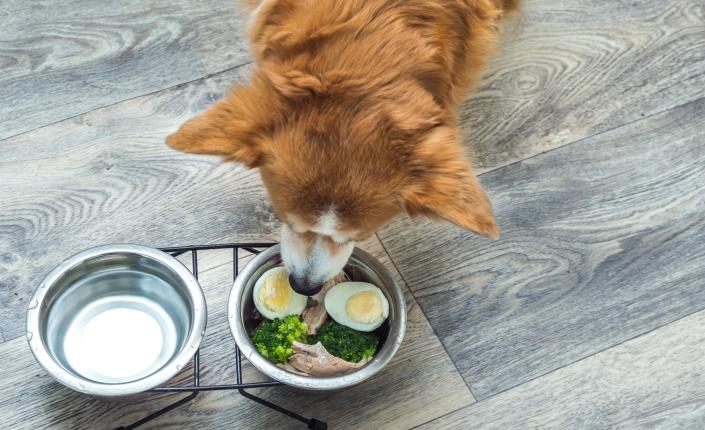Can My Dog Eat Eggs?

As more pet parents explore natural dietary options for their furry friends, eggs frequently emerge as a topic of discussion. These protein-rich powerhouses may indeed make a nutritious addition to your dog's diet when prepared appropriately. Let's explore everything you need to know about feeding eggs to your canine companion.
The Nutritional Power of Eggs
Eggs pack an impressive nutritional punch that may benefit your dog in numerous ways. They provide a concentrated source of protein, essential amino acids, and vital nutrients. The yolk particularly shines as a source of biotin, vitamin A, and omega-3 fatty acids. These nutrients have been purported to support everything from coat health to immune system function in our four-legged friends.
Many pet parents report improvements in their dog's coat lustre and skin health after adding eggs to their diet, while others appreciate having a wholesome treat option that doesn't involve processed ingredients. In the right circumstances, eggs can serve as an excellent protein supplement for active dogs, working breeds, or those recovering from illness.
Safe Ways to Prepare Eggs for Your Dog
The safest way to serve eggs to your dog is to cook them thoroughly. Here are several preparation methods that maintain nutritional benefits while ensuring safety:
- Scrambled eggs (without butter or seasonings)
- Hard-boiled eggs
- Poached eggs
Whichever method you choose, avoid adding salt, pepper, butter, or oils. These additions, while tasty to humans, aren't necessary for your dog and could cause health issues.
Can My Dog Eat Raw Eggs?
While some pet parents consider feeding raw eggs to their dogs, this practice requires careful consideration. Raw eggs carry certain risks that should be understood before making this choice.
The primary concerns with raw eggs include potential bacterial contamination, particularly Salmonella. While dogs generally have more robust digestive systems than humans, with shorter digestive tracts and more acidic stomach environments, they can still become ill from contaminated eggs. Additionally, they might become asymptomatic carriers of harmful bacteria, potentially affecting other family members.
Raw egg whites contain avidin, a protein that can interfere with biotin absorption. However, this typically only becomes problematic with excessive consumption, as egg yolks contain abundant biotin that helps offset this effect.
If you're considering raw eggs for your dog, always consult with your veterinarian first and source high-quality eggs from reputable suppliers.
What About Eggshells?
Eggshells can provide additional nutritional benefits, primarily as a calcium source. However, they require specific preparation for safe consumption. If you're interested in including eggshells in your dog's diet:
- Clean the shells thoroughly
- Bake them at 95°C for 10-15 minutes to eliminate bacteria
- Grind them into a fine powder to prevent digestive issues
Note that dogs on commercial diets typically receive adequate calcium, so adding eggshell powder may be unnecessary. Always consult your veterinarian before adding any supplements to your dog's diet.
Making Eggs Part of Your Dog's Diet
Whether you choose cooked or raw preparations, several factors merit attention when introducing eggs to your dog's diet:
Individual Considerations
Not every dog responds identically to eggs. Consider your dog's:
- Overall health status
- Age and size
- Existing dietary restrictions
- Individual digestive sensitivities
Proper Introduction Methods
When adding eggs to your dog's diet:
- Consult with your veterinarian first
- Start with small amounts
- Monitor for any digestive changes
- Maintain careful food hygiene practices
Veterinary Perspective
Some veterinarians recommend incorporating eggs as part of a balanced diet, primarily in their cooked form. This approach maintains nutritional benefits while minimizing potential risks. Regular veterinary check-ups and open discussion about dietary choices help ensure optimal health outcomes for our beloved companions.
The Bottom Line
Eggs can be a nutritious addition to your dog's diet when prepared appropriately. While some pet parents may choose to offer raw eggs, cooked preparations provide similar nutritional benefits with reduced risk. Whatever preparation method you choose, remember that eggs should complement a balanced diet rather than form its foundation.
Insurance Protection for Peace of Mind
While we strive to make informed decisions about our dogs' diets, accidents can happen. Even the most vigilant pet parents may find themselves rushing to the vet after their curious canine has sampled something questionable. Pet insurance can help provide valuable peace of mind and financial protection in these situations.
Many policies, like our accident and illness plans, can help cover the costs associated with eligible emergency veterinary visits, diagnostic tests, and treatments related to accidental ingestion. Having coverage in place can help you focus on getting your dog the care they need quickly, rather than worrying about the cost of emergency treatment.